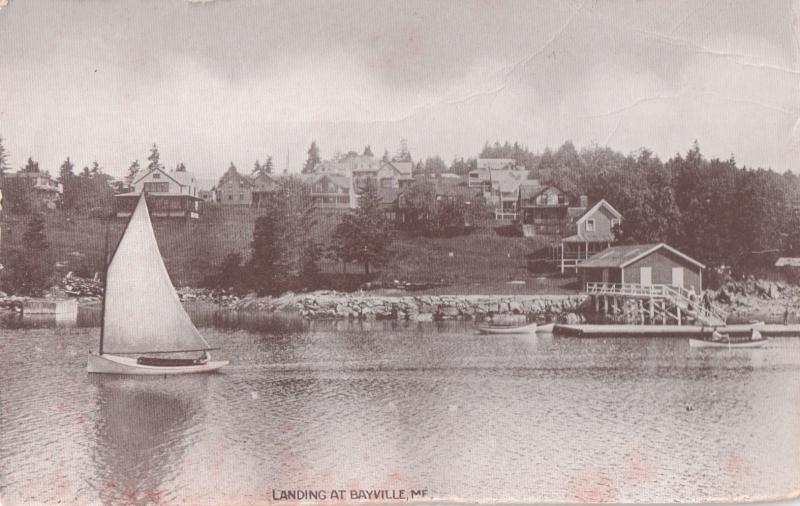The early history of Bayville, part I

The summer resort era in the Boothbay region dates to the 1870s and 1880s. Some people came here before then for recreational purposes, but the rise of summer colonies and a prevalent tourist culture dates to those decades.
The summer resort era
The wealthy always had the ability to travel "for their health," often a euphemism for a vacation.
The Industrial Revolution of the 1870s and later took things one step further, creating a middle class whose members often worked away from home and had the wherewithal to escape their worklife at times. An acceptance of ostentation, formerly reserved for the truly wealthy as a rule, accompanied the increased income. So boats and cottages became the thing to have for some.
And there was a newfound focus on the healthy outdoors, now that people were moving to office and factory work. It was a point of pride not to have a tan soon after people didn't have to labor in the gardens and fields to sustain themselves. Fairly quickly, as offices and factories became the norm rather then the exception, a tan was a point of pride to show you had the assets to not work incessantly.
Maine's pristine, rural quality and ease of transportation by rail and steamer pulled some who were seeking to rusticate. The trend was prodded along by trains and boats promoting their routes.
Land speculators also quickly capitalized on the trend, often building hotels to bring prospective lot purchasers near their developments. Boothbay was among the seaside places discovered.
Bayville as Hardscrabble
Bayville, located on Linekin Bay between East Boothbay and Boothbay Harbor, is a good example of the summer colony trend. Two years ago, I spoke at Bayville's 100th anniversary of its incorporation as a village corporation, its summer colony status. However, the summer retreat is actually about 135 years old. I thought some of its early highlights would make good articles, and the overseers agreed that I could so adapt my talk.
After the 1730 resettlement of the Boothbay peninsula by a permanent population, the first settler in the Bayville area was William Miller. He located about where the cellar hole (probably Miller's) is between Bayville and Tallwood, near the Tallwood cove. I believe Miller was brother to the 1730 East Boothbay settler Sarah Montgomery, Miller's next neighbor a mile to the east on Barlows Hill.
Miller left Boothbay, moving to Walpole by 1755. The land passed through a couple of other owners before Thomas Boyd obtained much of it in 1849.
By 1857, some members of the Boyd family (who traditionally owned large parcels of land at Back Narrows) moved to the Bayville area, then called Hardscrabble. They built out by the main road, Route 96, rather than down on the shore.
The name Hardscrabble stems from the nature of the land, which like other so-named places was difficult farm land. Such land was rewarded with a name implying a rocky, hillocky, hummocky area from which it was hard to extract a living. Luckily, summer people do not rely on the richness of the soil or amount of acreage to sustain themselves.
Thomas Boyd
For a few years Thomas Boyd lived in Dorchester, Mass., where he married Nancy Rice. After returning to Boothbay and Hardscrabble, he urged George Rice, Nancy's brother to come from Dorchester to help him build houses.
By 1865 the Boyd (future Bayville) piece had four sizeable houses and three small buildings (fishhouses probably) down on the shore. At least, Rice, Isaac Reed, and Harvey Farnham were down there.
George Rice married a daughter of Murray Hill shipbuilder, Jacob Fuller and moved to the village of East Boothbay within a few years. He became a shipbuilder himself and was father of the founders of the well-known Rice Brothers shipyard.
Bayville is unique in being a summer colony initially developed by a native of Boothbay, Thomas Boyd. Normally one or more men from elsewhere buy land that is transformed into a summer colony.
Boyd continued building houses; and by the mid-1870s he was encouraging rusticating at Hardscrabble. According to the Register, for two weeks in August 1877 there were campers from Chelsea, Mass., who came by yacht to Hardscrabble with quite an array of tents for different purposes. By May 2, 1880 the Boothbay Register recorded, "Hardscrabble is Hardscrabble no more. Six houses, two new this spring."
An August 1885 Register clipping described the residents at Bayville as still mostly from the Boston area. A June 1888 clipping also listed 10 houses and its many Boston area residents, including a concentration of Boston area university professors, particularly Tufts.
In keeping with the times it reported, "Occupants come here to cast off some of the toggery of fashion … where this little hamlet affords a real genuine summer rest and recreation."
Though many of the Bayville colonists originated in the Boston area, it's unknown if they came here because of prior acquaintance with Boyd and Rice in Massachusetts.
Next time: Bayville's incorporation.
































.png)
.png)
